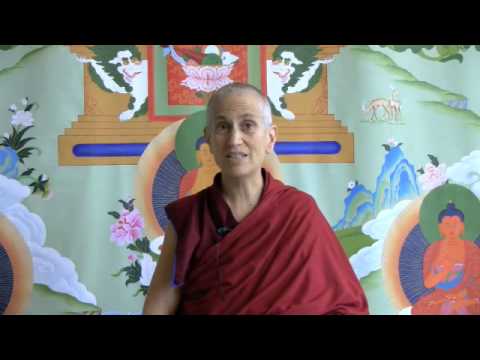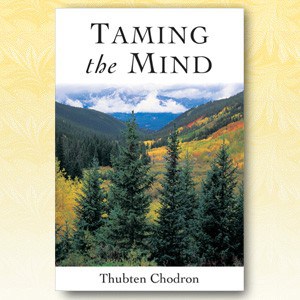The eight disadvantages of cyclic existence
Stages of the Path #91: The Four Noble Truths
Part of a series of Bodhisattva's Breakfast Corner talks on the Stages of the Path (or Lamrim) as described in the Guru Puja text by Panchen Lama I Lobsang Chokyi Gyaltsen.
- The fear in not being prepared for death
- Separation from the things and people that we like
- When we get what we like, but it is not satisfying
- Meditating on these topics using our own personal experience
We’ll finish up with the eight disadvantages of cyclic existence that we started on. We have birth, aging, sickness, death.
Death, clearly, nobody looks forward to that. It’s not our favorite thing to do. Knowing that in cyclic existence we die again and again, and go through the torment of leaving this body, leaving our possessions, leaving our friends and relatives, leaving a whole, nice, comfortable ego-structure of “who I am” behind as it totally dissolves can be quite a frightening experience if we’re not prepared for it. As well as physically painful, depending upon how one dies. So that’s definitely a disadvantage of cyclic existence. And it comes about as a natural result of birth. There’s no way to be born and not die. We haven’t seen an example of anybody historically who has been immortal and never died. Even every single great religious leader also shows impermanence and leaves their coarse body.
Then we spoke before of not getting what we like and getting what we don’t like.
A seventh disadvantage is being separated from what we like. We get what we like, but then we’re separated from it. Relationships split, people die, we’re separated from what we like, what we treasure. The stock market goes down and you lose everything. Sometimes this one is also described as you get what you like but then it turns out to be unsatisfactory. They kind of boil down to the same point, because you’ve gotten what you like and then you’ve lost it, either because it’s unsatisfactory or it’s disappeared from you.
We see that again and again in our lives, don’t we? We have some nice situation and it’s impossible to hang onto it, it changes, disappears, and we’re separated from possessions, people, places, opportunities that we like.
The last of the eight disadvantages is being under the control of afflictions and karma, and by that force taking the five aggregates again and again. This is similar to the third type of dukkha, where we’re just forced again and again by the ignorance, the afflictions, and the karma, to take one rebirth after another.
This is the worst kind of disadvantage, the worst kind of dukkha, because it’s the one that just keeps the whole cycle going again and again. And then as it goes again, and again we get birth, aging, sickness, and death. In between birth and death we don’t get what we want, we get what we don’t want, and we lose the good things that we have.
These are very helpful to meditate on in terms of our own personal experience, and really go through the times when we haven’t gotten what we wanted and how we felt. And when we’ve gotten what we wanted and we’ve been separated from them, or it didn’t turn out to be as good as we thought it was going to be. Or how hard we worked to avoid problems and they just keep coming. Really make some examples of this in our lives, and then come to the conclusion that “therefore we want to get out of the cycle in which we’re obliged to experience these kinds of dukkha.” You don’t come to the conclusion that therefore life is depressing and meaningless. That is the wrong conclusion. And I really say this, because often people have some awareness of this, and they really come to the wrong conclusion because they don’t understand the Dharma. But the whole purpose of the Dharma is to stop these and to realize that they can be stopped by eliminating their causes. When you get depressed you don’t do anything to eliminate the cause, except maybe think killing yourself will eliminate the cause. But that doesn’t even eliminate the cause. You just come back again. The only way to eliminate it is through Dharma practice. And specifically through gaining the wisdom realizing emptiness. That has the power to eliminate all these disadvantageous circumstances. And so that’s why we practice and why we meditate on emptiness. And why we should be happy, because there’s an actual antidote to this mess. Whereas when you’re depressed, and you don’t know anything about Dharma, you think there’s no antidote at all, and that is ignorance itself. That’s another example of how ignorance keeps us immersed in samsara. There it’s the ignorance of conventionalities. You don’t have any faith in cause and effect, you don’t think that there are causes to free yourself from the situation, and so on.
Venerable Thubten Chodron
Venerable Chodron emphasizes the practical application of Buddha’s teachings in our daily lives and is especially skilled at explaining them in ways easily understood and practiced by Westerners. She is well known for her warm, humorous, and lucid teachings. She was ordained as a Buddhist nun in 1977 by Kyabje Ling Rinpoche in Dharamsala, India, and in 1986 she received bhikshuni (full) ordination in Taiwan. Read her full bio.


